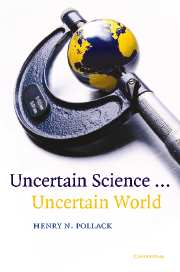Book contents
- Frontmatter
- Contents
- Acknowledgments
- About the author
- 1 Setting the stage
- 2 Uncertain about science
- 3 Can the media help?
- 4 Unfamiliarity breeds uncertainty
- 5 Fever or chill?
- 6 A fifty–fifty chance
- 7 I'm not quite sure how this works …
- 8 Let's see what happens if …
- 9 Reconstructing the past
- 10 Predicting the future
- 11 Out of the blue
- 12 In a climate of uncertainty
- Index
2 - Uncertain about science
Published online by Cambridge University Press: 11 August 2009
- Frontmatter
- Contents
- Acknowledgments
- About the author
- 1 Setting the stage
- 2 Uncertain about science
- 3 Can the media help?
- 4 Unfamiliarity breeds uncertainty
- 5 Fever or chill?
- 6 A fifty–fifty chance
- 7 I'm not quite sure how this works …
- 8 Let's see what happens if …
- 9 Reconstructing the past
- 10 Predicting the future
- 11 Out of the blue
- 12 In a climate of uncertainty
- Index
Summary
This notion that “science” is something that belongs in a separate compartment of its own, apart from everyday life, is one that I should like to challenge. We live in a scientific age; yet we assume that knowledge is the prerogative of only a small number of human beings. … This is not true. The materials of science are the materials of life itself. Science is the reality of living, it is the what, the how, and the why in everything in our experience.
Rachel Carson, in accepting the 1952 National Book Award for The Sea Around UsScience, as Rachel Carson observed, is a part of the very fabric of life. It has its strengths and weaknesses, its successes and failures, its doubts and uncertainties. As scientists attempt to understand how a cell malfunctions to produce cancer, how a gene transmits information to guide an organism's development, how an ecosystem responds to urban sprawl, or how the entire Earth responds to long-term changes in the chemistry of its atmosphere, these investigations are enveloped with uncertainty at every stage. The uncertainty arises in many ways, and the nature of the uncertainty may change through time, but the scientific endeavor is never free of uncertainty.
Has science been debilitated by uncertainty? To the contrary, the successes of science, and indeed there are many, arise from the ways that scientists have learned to make use of uncertainty in their quests for knowledge.
- Type
- Chapter
- Information
- Uncertain Science ... Uncertain World , pp. 5 - 22Publisher: Cambridge University PressPrint publication year: 2003



